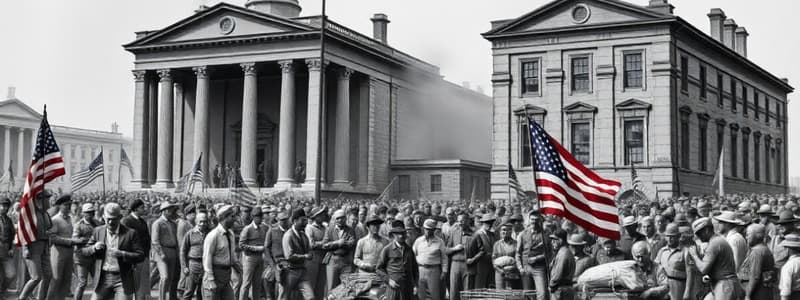Podcast
Questions and Answers
What key theme associated with the Colonial Period involves rising tensions with Great Britain?
What key theme associated with the Colonial Period involves rising tensions with Great Britain?
- Integration of indigenous cultures
- Economic independence
- Political representation (correct)
- Development of colonial societies
Which event most significantly contributed to the rise of sectionalism during the Early Republic?
Which event most significantly contributed to the rise of sectionalism during the Early Republic?
- The Louisiana Purchase (correct)
- The War of 1812
- The signing of the Treaty of Ghent
- The Northwest Ordinance
Which major social movement of the 19th Century sought to end slavery in the United States?
Which major social movement of the 19th Century sought to end slavery in the United States?
- Women's Suffrage Movement
- Abolitionist Movement (correct)
- Progressive Movement
- Labor Movement
Which of the following events was a direct outcome of Manifest Destiny during the 19th Century?
Which of the following events was a direct outcome of Manifest Destiny during the 19th Century?
During the Progressive Era, which of the following movements significantly focused on trust-busting?
During the Progressive Era, which of the following movements significantly focused on trust-busting?
What major global conflict shaped American foreign policy during the 20th Century?
What major global conflict shaped American foreign policy during the 20th Century?
Which key figure is most closely associated with the Civil Rights Movement?
Which key figure is most closely associated with the Civil Rights Movement?
Which of the following describes a major challenge in the 21st Century related to foreign policy?
Which of the following describes a major challenge in the 21st Century related to foreign policy?
Flashcards
AP US History
AP US History
Covers US history from colonial times to present, emphasizing key themes and developments, critical thinking, and source analysis.
Colonial Period
Colonial Period
The period from 1492 to 1763, characterized by European exploration and colonization of North America, the establishment of colonies, and growing tensions with Britain.
Westward Expansion
Westward Expansion
The process of expanding westward across North America, driven by ideals of Manifest Destiny, land acquisition, and resource exploitation.
Progressive Era
Progressive Era
Signup and view all the flashcards
The Civil War
The Civil War
Signup and view all the flashcards
Civil Rights Movement
Civil Rights Movement
Signup and view all the flashcards
The Cold War
The Cold War
Signup and view all the flashcards
Globalization
Globalization
Signup and view all the flashcards
Study Notes
Key Concepts
- AP US History covers US history from colonial times to the present, focusing on key themes and developments.
- The curriculum encourages critical thinking, primary and secondary source analysis, and understanding historical context.
- The exam evaluates students' ability to interpret events, analyze arguments, and synthesize information from different viewpoints.
- Students should understand major historical periods, events, and themes like political institutions, social movements, economic changes, cultural trends, foreign policy, and westward expansion.
Time Periods and Themes
- Colonial Period: Exploration, colonization, early settlement patterns, diverse colonial societies, regional differences, and rising tensions with Great Britain.
- Revolutionary Era: Causes of the American Revolution, key figures, wartime events, Declaration of Independence, Constitution, and the new nation's formation.
- Early Republic: Establishing government, westward expansion, Louisiana Purchase, War of 1812, sectionalism's rise, and early industrialization.
- 19th Century: Manifest Destiny, westward expansion, Mexican-American War, slavery and the abolitionist movement, Civil War, Reconstruction, industrialization, immigration, and Populism.
- Progressive Era: Reforms, labor movements, trust-busting, environmentalism, and increasing American global influence.
- 20th Century: World War I, World War II, Cold War, Civil Rights Movement, Vietnam War, consumer society's rise, and social/political transformations.
- 21st Century: Globalization, technological advancements, social/political division, economic crises, demographic shifts, and foreign policy challenges.
Key Historical Figures and Movements
- Understanding influential figures like George Washington, Thomas Jefferson, Abraham Lincoln, Susan B. Anthony, Martin Luther King, Jr., and others is crucial.
- Recognizing significant social movements, including the abolitionist, women's suffrage, and Civil Rights Movements.
Important Events
- Students should be familiar with major events like the Boston Tea Party, Declaration of Independence signing, Louisiana Purchase, Civil War, John F. Kennedy's assassination, and September 11, 2001.
Skills and Approaches
- Critical thinking and analysis skills are essential for success.
- Understanding primary source documents is vital.
- Synthesizing information from various sources and forming informed perspectives on historical events is a key skill.
- Analyzing historical context is critical for understanding motivations and consequences.
- Evaluating diverse interpretations of the same historical period is a valuable approach.
Studying That Suits You
Use AI to generate personalized quizzes and flashcards to suit your learning preferences.




